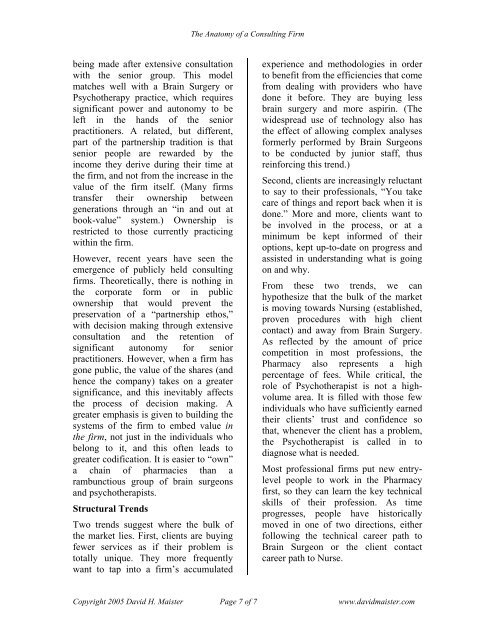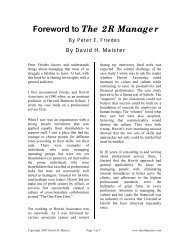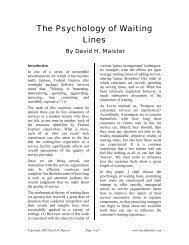pdf version - David Maister
pdf version - David Maister
pdf version - David Maister
Create successful ePaper yourself
Turn your PDF publications into a flip-book with our unique Google optimized e-Paper software.
The Anatomy of a Consulting Firm<br />
being made after extensive consultation<br />
with the senior group. This model<br />
matches well with a Brain Surgery or<br />
Psychotherapy practice, which requires<br />
significant power and autonomy to be<br />
left in the hands of the senior<br />
practitioners. A related, but different,<br />
part of the partnership tradition is that<br />
senior people are rewarded by the<br />
income they derive during their time at<br />
the firm, and not from the increase in the<br />
value of the firm itself. (Many firms<br />
transfer their ownership between<br />
generations through an “in and out at<br />
book-value” system.) Ownership is<br />
restricted to those currently practicing<br />
within the firm.<br />
However, recent years have seen the<br />
emergence of publicly held consulting<br />
firms. Theoretically, there is nothing in<br />
the corporate form or in public<br />
ownership that would prevent the<br />
preservation of a “partnership ethos,”<br />
with decision making through extensive<br />
consultation and the retention of<br />
significant autonomy for senior<br />
practitioners. However, when a firm has<br />
gone public, the value of the shares (and<br />
hence the company) takes on a greater<br />
significance, and this inevitably affects<br />
the process of decision making. A<br />
greater emphasis is given to building the<br />
systems of the firm to embed value in<br />
the firm, not just in the individuals who<br />
belong to it, and this often leads to<br />
greater codification. It is easier to “own”<br />
a chain of pharmacies than a<br />
rambunctious group of brain surgeons<br />
and psychotherapists.<br />
Structural Trends<br />
Two trends suggest where the bulk of<br />
the market lies. First, clients are buying<br />
fewer services as if their problem is<br />
totally unique. They more frequently<br />
want to tap into a firm’s accumulated<br />
experience and methodologies in order<br />
to benefit from the efficiencies that come<br />
from dealing with providers who have<br />
done it before. They are buying less<br />
brain surgery and more aspirin. (The<br />
widespread use of technology also has<br />
the effect of allowing complex analyses<br />
formerly performed by Brain Surgeons<br />
to be conducted by junior staff, thus<br />
reinforcing this trend.)<br />
Second, clients are increasingly reluctant<br />
to say to their professionals, “You take<br />
care of things and report back when it is<br />
done.” More and more, clients want to<br />
be involved in the process, or at a<br />
minimum be kept informed of their<br />
options, kept up-to-date on progress and<br />
assisted in understanding what is going<br />
on and why.<br />
From these two trends, we can<br />
hypothesize that the bulk of the market<br />
is moving towards Nursing (established,<br />
proven procedures with high client<br />
contact) and away from Brain Surgery.<br />
As reflected by the amount of price<br />
competition in most professions, the<br />
Pharmacy also represents a high<br />
percentage of fees. While critical, the<br />
role of Psychotherapist is not a highvolume<br />
area. It is filled with those few<br />
individuals who have sufficiently earned<br />
their clients’ trust and confidence so<br />
that, whenever the client has a problem,<br />
the Psychotherapist is called in to<br />
diagnose what is needed.<br />
Most professional firms put new entrylevel<br />
people to work in the Pharmacy<br />
first, so they can learn the key technical<br />
skills of their profession. As time<br />
progresses, people have historically<br />
moved in one of two directions, either<br />
following the technical career path to<br />
Brain Surgeon or the client contact<br />
career path to Nurse.<br />
Copyright 2005 <strong>David</strong> H. <strong>Maister</strong> Page 7 of 7 www.davidmaister.com











